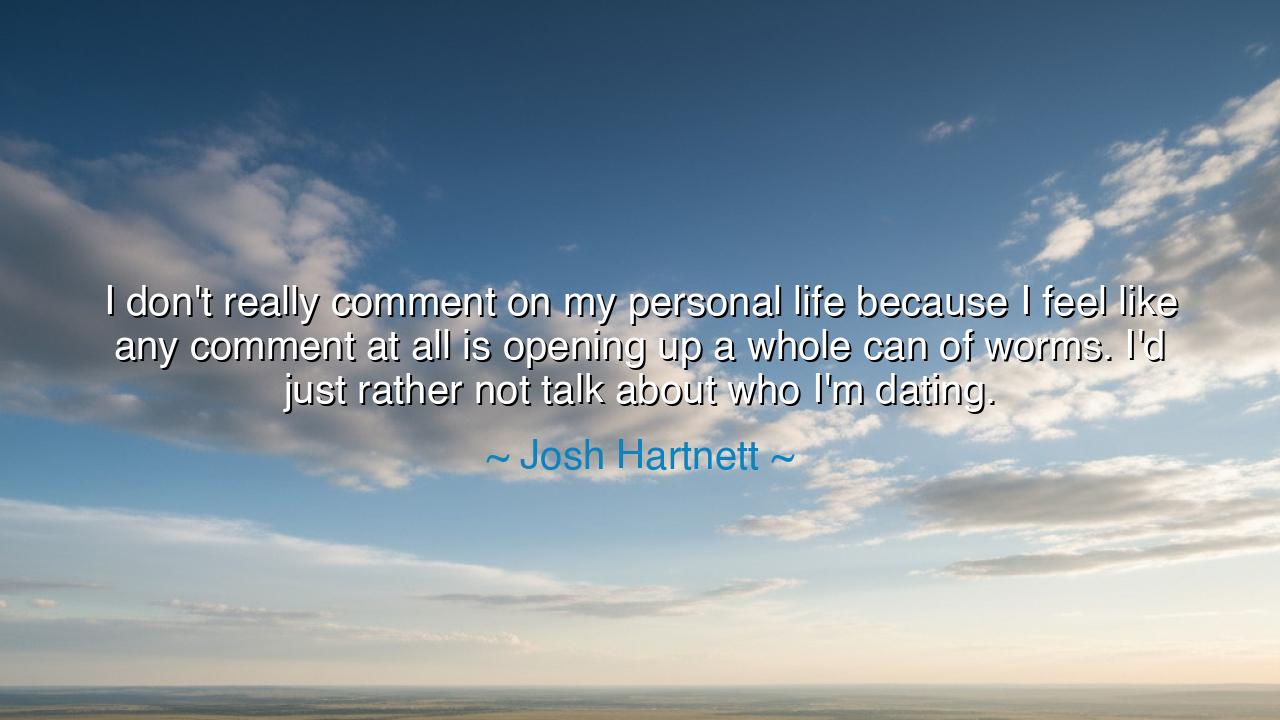
I don't really comment on my personal life because I feel like
I don't really comment on my personal life because I feel like any comment at all is opening up a whole can of worms. I'd just rather not talk about who I'm dating.






In the words of Josh Hartnett, we hear the quiet wisdom of one who has walked through the bright fire of fame and learned the value of silence: “I don't really comment on my personal life because I feel like any comment at all is opening up a whole can of worms. I'd just rather not talk about who I'm dating.” These words may seem modest, even guarded, yet beneath them lies a truth that is ancient and profound: that privacy is a form of power, and that the soul must sometimes be hidden from the gaze of the world to remain whole. In an age where confession is celebrated and exposure mistaken for authenticity, Hartnett’s restraint is not weakness—it is discipline, born of wisdom hard-earned.
Long ago, the sages taught that speech is both seed and sword. It can bring life, or it can wound; it can reveal the heart, or betray it. The ancients believed that to speak without purpose was to give away a fragment of one’s spirit, scattering it to the winds. Hartnett’s words echo this old truth. When he refuses to discuss his personal life, he is not merely avoiding gossip—he is preserving something sacred. For in the clamor of voices and the frenzy of curiosity, a man’s peace becomes a fragile thing, easily torn by misunderstanding and speculation. To guard one’s silence, then, is to protect the quiet sanctuary where love and identity dwell.
There is an old tale from the East about a monk who carried a jug of pure water up a mountain. As he climbed, travelers stopped him again and again, asking to see what he bore. To please them, he uncovered it, and each time a little dust entered the jug. When he reached the summit, the water was no longer clear—it had been clouded by too many eyes. The monk wept, for what was once pure was now disturbed. So it is with private life in the glare of attention: each question, each judgment, each careless remark stirs the dust, and the clarity of one’s spirit is lost.
Josh Hartnett, once the face of youth and promise in the world of cinema, knew well the double edge of public adoration. The more the world desired to see him, the more he learned that exposure could devour a person’s truth. Many before him had been consumed by the same hunger for fame—souls who mistook attention for affection, and publicity for love. But Hartnett chose another path, one of quietness and self-possession. He turned away from the flashing lights, not in disdain, but in preservation. His silence became his rebellion—a reminder that to withhold is sometimes nobler than to reveal.
The ancients also taught that mystery is not deceit but dignity. The flower does not boast of its fragrance; it simply blooms. The mountain does not explain its stillness; it simply stands. Likewise, the human heart does not need to be displayed to be real. When Hartnett refuses to “open up a can of worms,” he is recognizing that human intimacy, once made a spectacle, ceases to be intimate. It becomes theater, consumed by strangers. And love, stripped of privacy, loses its sacredness.
Consider the story of Marcus Aurelius, the philosopher-emperor of Rome. Though he commanded armies and ruled vast lands, he kept his heart hidden within his writings—The Meditations, a journal meant not for others but for his own soul. He wrote not to impress, but to understand himself. His greatness lay not in what he shared with the crowds, but in what he guarded from them. So too must we learn to hold some parts of ourselves beyond reach, to let the deepest truths remain ours alone. For what is kept in silence grows stronger, while what is cast before the world is often diminished.
The lesson is clear: in an age of noise, choose quiet. In a culture of exposure, choose depth. Guard your privacy not out of fear, but out of reverence for the sacredness of your inner life. Do not rush to explain yourself to those who demand to know, for not all questions are worthy of answers. Let your actions speak, and let your silence protect what words cannot. The wise know that the truest things—the heart, the soul, the bond of love—thrive best when sheltered from the storm of attention.
So, take this teaching to heart: keep a portion of your life as the ancients kept their sacred fires—hidden, tended, and pure. The world may hunger for your story, but not all of it is theirs to consume. Like Josh Hartnett, learn the art of silence. For in silence there is strength, and in privacy, peace. The world may forget the noise, but it will remember the stillness of one who lived with quiet honor.






AAdministratorAdministrator
Welcome, honored guests. Please leave a comment, we will respond soon